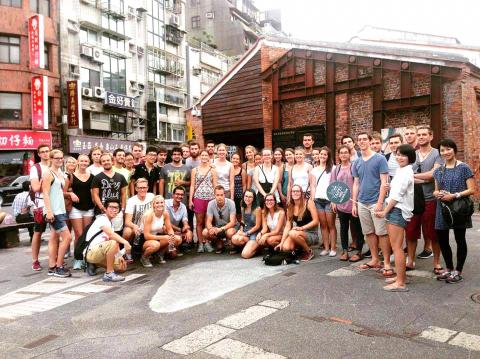When Becky Liu (劉樾) visited the Plum Pavillion (梅亭) in Taipei’s Beitou District (北投), it reminded her of her great-grandfather, who, like the pavilion’s former resident, former Control Yuan president Yu You-jen (于右任), was an expert calligrapher.
“Through this connection, I can tell [tourists] about calligraphy in our culture and what it represents,” she says.
This is one of the personal experiences that local tour guides will relate during Sunday’s Beitou, Hundred Years a day walking tour, organized by Like It Formosa (來去福爾摩沙), formed by a group of twenty-something locals dedicated to a variety of walking tours all conducted in English.

Photo courtesy of Like It Formosa
“We want our guides to not read from a book but to incorporate their personal experiences and serve as storytellers and performers,” says founding member Julia Kao (高于晴). “We want to present to foreigners the perspective of local young people.”
She adds that visitors have joined the same tour multiple times just to hear different tour guides share their experiences.
Formed early last year, Like It Formosa started out last September and October with two pay-as-you-want weekly walking tours of Taipei — a historic one every Thursday that takes people through the old Taipei neighborhoods on the western end, and a modern one every Sunday that shuffles through the bustling East and Xinyi districts from Sun Yat-sen Memorial Hall to 44 South Village (四四南).
They launched their first paid tour in November — an LGBT Taipei one that took visitors to locations such as an LGBT bookstore and Rainbow Sauna (彩虹會館), a 24-hour gay establishment. Sunday’s Beitou tour is their first time taking people to northern Taipei, and they have more tours planned for later this year.
These young Taiwanese aren’t just looking to show foreigners what Taiwan is about. They say it’s also a self-exploration of what it means to be Taiwanese, which is a question local students especially struggle with when asked to present their culture while studying overseas.
“When I went on the tours myself, I felt pretty impacted,” Kao says. “To locals, it’s a chance to get to know Taiwan all over again.”
“When we pass by the Presidential Palace, we can discuss the protests and democracy in Taiwan,” Liu adds. “In Ximen, we can talk about Japanese influence on the city. Through exchanges with tourists, we can in turn ponder deeper questions about where we live.”

In the March 9 edition of the Taipei Times a piece by Ninon Godefroy ran with the headine “The quiet, gentle rhythm of Taiwan.” It started with the line “Taiwan is a small, humble place. There is no Eiffel Tower, no pyramids — no singular attraction that draws the world’s attention.” I laughed out loud at that. This was out of no disrespect for the author or the piece, which made some interesting analogies and good points about how both Din Tai Fung’s and Taiwan Semiconductor Manufacturing Co’s (TSMC, 台積電) meticulous attention to detail and quality are not quite up to

April 21 to April 27 Hsieh Er’s (謝娥) political fortunes were rising fast after she got out of jail and joined the Chinese Nationalist Party (KMT) in December 1945. Not only did she hold key positions in various committees, she was elected the only woman on the Taipei City Council and headed to Nanjing in 1946 as the sole Taiwanese female representative to the National Constituent Assembly. With the support of first lady Soong May-ling (宋美齡), she started the Taipei Women’s Association and Taiwan Provincial Women’s Association, where she

It is one of the more remarkable facts of Taiwan history that it was never occupied or claimed by any of the numerous kingdoms of southern China — Han or otherwise — that lay just across the water from it. None of their brilliant ministers ever discovered that Taiwan was a “core interest” of the state whose annexation was “inevitable.” As Paul Kua notes in an excellent monograph laying out how the Portuguese gave Taiwan the name “Formosa,” the first Europeans to express an interest in occupying Taiwan were the Spanish. Tonio Andrade in his seminal work, How Taiwan Became Chinese,

Mongolian influencer Anudari Daarya looks effortlessly glamorous and carefree in her social media posts — but the classically trained pianist’s road to acceptance as a transgender artist has been anything but easy. She is one of a growing number of Mongolian LGBTQ youth challenging stereotypes and fighting for acceptance through media representation in the socially conservative country. LGBTQ Mongolians often hide their identities from their employers and colleagues for fear of discrimination, with a survey by the non-profit LGBT Centre Mongolia showing that only 20 percent of people felt comfortable coming out at work. Daarya, 25, said she has faced discrimination since she